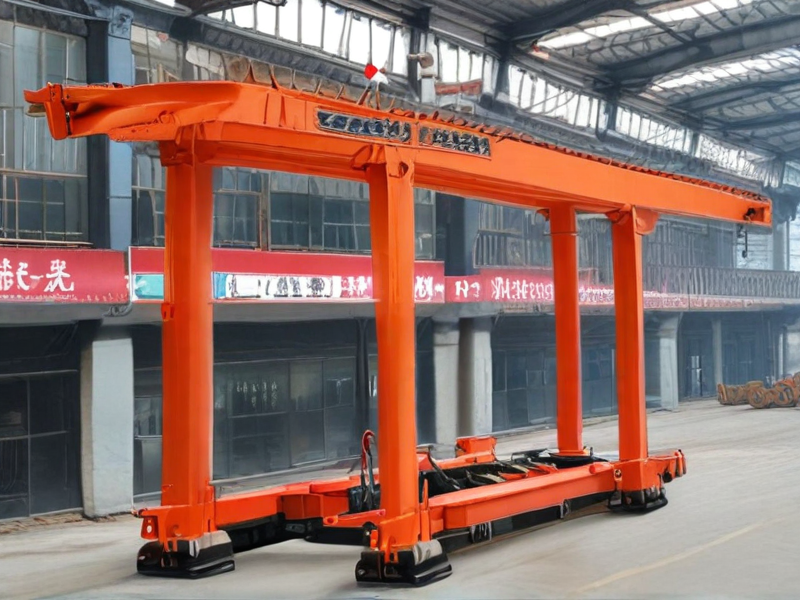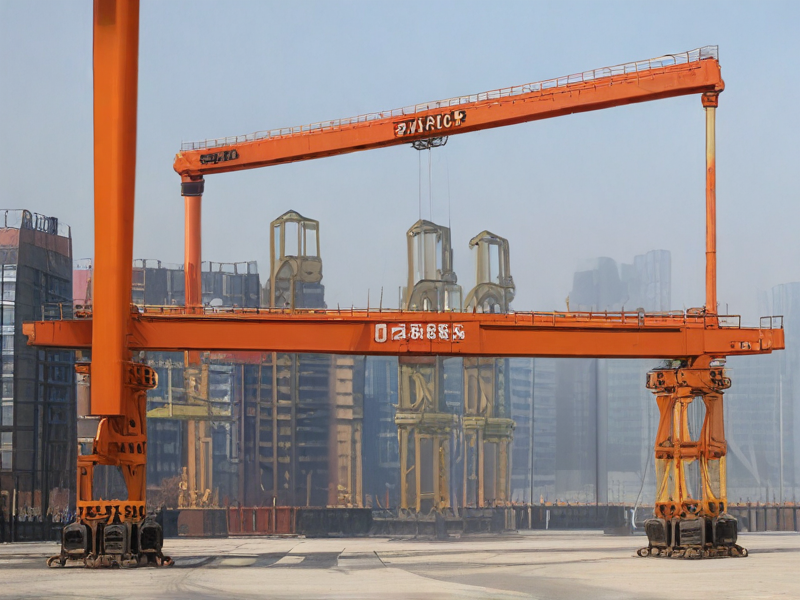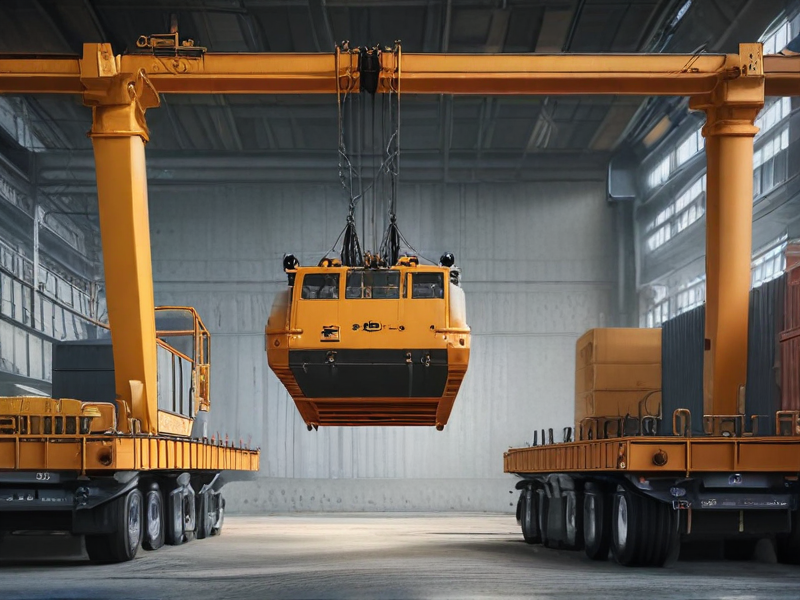Top 10 manufacturer crane in China introduce,list main products and website if have
Certainly! Here’s a brief overview of the top 10 crane manufacturers in China, including their main products and websites:
1. XCMG Group
– Main Products: Mobile cranes, tower cranes, crawler cranes, truck-mounted cranes.
– Website: [XCMG Group](http://www.xcmg.com/)
2. Sany Heavy Industry Co., Ltd.
– Main Products: All-terrain cranes, crawler cranes, truck cranes, rough terrain cranes.
– Website: [Sany Group](http://www.sanyglobal.com/)
3. Zoomlion Heavy Industry Science & Technology Co., Ltd.
– Main Products: Tower cranes, truck cranes, crawler cranes, all-terrain cranes.
– Website: [Zoomlion](http://en.zoomlion.com/)
4. Liebherr Machinery (Dalian) Co., Ltd.
– Main Products: Mobile cranes, crawler cranes, tower cranes, maritime cranes.
– Website: [Liebherr](https://www.liebherr.com/)
5. Fushun Yongmao Construction Machinery Co., Ltd.
– Main Products: Tower cranes, luffing tower cranes, top-slewing cranes.
– Website: [Yongmao](http://www.yongmaogroup.com/)
6. Zhejiang Construction Machinery Group Co., Ltd. (ZCM)
– Main Products: Tower cranes, construction hoists, derrick cranes.
– Website: [ZCM](http://www.zjcm.com.cn/)
7. Shandong Huaxia Group Co., Ltd.
– Main Products: Mobile cranes, tower cranes, construction hoists.
– Website: [Huaxia Group](http://www.huaxia-group.com/)
8. Sichuan Chengdu Cheng Gong Construction Machinery Co., Ltd.
– Main Products: Mobile cranes, tower cranes, construction elevators.
– Website: [Cheng Gong Machinery](http://www.chenggong-china.com/)
9. FUWA Heavy Industry
– Main Products: Crawler cranes, pile driving rigs, special cranes.
– Website: [FUWA](http://www.fuwacranes.com/)
10. Qingdao Haixi Heavy-Duty Machinery Co., Ltd.
– Main Products: Gantry cranes, overhead cranes, mobile cranes, port cranes.

How to find and select check reliable manufacturer crane in China
Finding and selecting a reliable crane manufacturer in China involves several steps:
1. Research and Shortlist:
– Use online directories like Alibaba, Made-in-China, and Global Sources to find crane manufacturers.
– Check for verified suppliers and review their profiles for experience, certifications, and product range.
2. Verify Legitimacy:
– Look for ISO certifications and compliance with international standards.
– Check the company’s registration on the National Enterprise Credit Information Publicity System (China) to ensure legitimacy.
3. Evaluate Reputation:
– Read customer reviews and testimonials.
– Search for any news articles or industry reports about the manufacturer.
4. Request Documentation:
– Ask for company brochures, product catalogs, and technical specifications.
– Request proof of previous projects, patents, and test reports.
5. Engage in Direct Communication:
– Contact the manufacturer directly via email or phone.
– Evaluate their responsiveness and willingness to provide detailed information.
6. Assess Quality Control:
– Inquire about their quality control processes and inspection procedures.
– Ask for product samples or arrange a virtual tour of their manufacturing facility.
7. Check Financial Stability:
– Request financial statements or reports to ensure they have a stable operation.
8. Third-Party Verification:
– Hire an independent third-party inspection company to audit the factory and verify the product quality.
9. Compare Quotes:
– Obtain detailed quotes from multiple manufacturers and compare them in terms of price, quality, and after-sales service.
10. Negotiate Terms:
– Negotiate payment terms, delivery schedules, and warranty conditions.
By following these steps, you can increase the likelihood of finding a reliable crane manufacturer in China.
Background Research for manufacturer crane in China, use qcc.com archive.org importyeti.com
To conduct background research on a crane manufacturer in China using qcc.com, archive.org, and importyeti.com, follow this succinct guide:
Qcc.com
Qcc.com is a comprehensive platform that provides detailed information about Chinese companies. You can search for crane manufacturers using keywords like “crane manufacturer” or the company’s Chinese name if known. Key details to retrieve include:
– Company Registration Information: Verify the legitimacy of the manufacturer through its business license number, registration date, and legal representative details.
– Financial Health: Check financial statements, annual revenue, profit margins, and any financial risks or credit ratings.
– Certifications and Patents: Look for ISO certifications, product patents, and other industry-specific compliance records.
– Litigation Records: Review any legal disputes or court cases involving the manufacturer.
Archive.org
Archive.org, also known as the Wayback Machine, allows you to view the historical versions of the manufacturer’s website. Steps include:
– Website Changes: Track how the company’s website and product offerings have evolved.
– Corporate Announcements: Look for historical press releases, partnership announcements, and changes in corporate structure.
– Archived Documents: Access old brochures, technical manuals, and service records to gauge product evolution and reliability.
ImportYeti.com
ImportYeti.com provides insights into a company’s import/export activities. For a detailed analysis:
– Search for Manufacturer: Use the manufacturer’s name to find their trade data, including key trade routes and volumes.
– Supplier Relationships: Identify major suppliers and customers to understand the company’s market position and reliability.
– Product Details: Review the types of cranes the manufacturer exports, including models, quantities, and shipment frequencies.
Summary
Utilize these platforms to gather comprehensive data on Chinese crane manufacturers. Qcc.com will offer company legitimacy and financial health insights, archive.org will allow historical website and document analysis, and ImportYeti will provide trade data to assess market activity. Collectively, these sources will help you make an informed decision about the manufacturer’s credibility and reliability.

Price Cost Research for manufacturer crane in China, use temu.com and 1688.com
Price Cost Research for Manufacturer Cranes in China
#### Platforms: TEMU.com and 1688.com
TEMU.com
TEMU.com serves as an emerging global e-commerce platform, similar to Amazon. Pricing for cranes on TEMU can be competitive, and the platform tends to feature a mix of smaller and larger manufacturers.
– Small Cranes: Prices for smaller, portable cranes can start around $500 to $1,000.
– Medium Cranes: Costs typically range from $1,500 to $5,000.
– Large Industrial Cranes: These can range significantly higher, often starting at around $10,000 and can go upwards depending on specifications.
1688.com
1688.com, operated by Alibaba Group, is widely used for wholesale and bulk purchasing directly from Chinese manufacturers. It’s a prime resource for getting lower prices on bulk orders but requires navigating the site in Chinese and usually involves dealing directly with suppliers.
– Mini Cranes: Prices may start as low as ¥2,000 (approximately $275 USD).
– Workshop Cranes: These can range from ¥3,500 to ¥10,000 ($500 to $1,400 USD).
– Heavy-Duty Industrial Cranes: Typically range from ¥20,000 to ¥100,000 ($2,800 to $14,000 USD) depending on capacity and features.
Considerations:
1. Shipping Costs: Both platforms do not usually include shipping, which can significantly affect the final cost, especially for heavy machinery.
2. MOQ (Minimum Order Quantity): Many listings on 1688.com have MOQs which could be beneficial for bulk purchasing but may not be as flexible for single item purchases.
3. Customization and Specifications: Prices can vary based on customization needs, such as load capacity, height, and additional features.
4. Negotiation: Particularly on 1688.com, there’s room for negotiation, especially for large orders.
Conclusion:
For small to medium-sized cranes, TEMU.com offers accessible prices with potentially higher shipping costs due to more streamlined, user-friendly transactions. For larger, industrial cranes, 1688.com provides competitive bulk pricing, with the added need for negotiation and potential customization benefits.
Both platforms require due diligence on supplier credibility and product specifications to ensure quality and value.
Compare China and Other manufacturer crane: Products Quality and Price,Visible and Hidden Costs
When comparing cranes manufactured in China versus those made by other global manufacturers, several factors must be considered: quality, price, visible costs, and hidden costs.
Products Quality and Price:
Chinese cranes have significantly improved in quality over the past decade, closing the gap with Western and Japanese manufacturers. They typically offer robust performance at a lower price point. However, cranes from established Western and Japanese brands often exhibit superior build quality, advanced technology, and longer lifespans, justifying their higher prices. Brands like Liebherr, Manitowoc, and Tadano are known for their reliability and innovation.
Visible Costs:
These include the purchase price, shipping, and import duties. Chinese cranes are generally more affordable upfront, making them attractive for cost-sensitive projects. However, the costs from reputable brands are higher due to advanced features and premium materials used.
Hidden Costs:
Hidden costs encompass maintenance, parts availability, downtime, and resale value.
– *Maintenance and Parts Availability:* While Chinese manufacturers have improved, parts might not be as readily available, potentially leading to longer downtime and higher maintenance costs. In contrast, Western and Japanese brands have established global service networks, ensuring quicker access to genuine parts and skilled technicians.
– *Resale Value:* Cranes from top-tier global brands generally hold their value better due to recognized durability and brand reputation, making them a more cost-effective long-term investment despite the higher initial price.
In conclusion, while Chinese cranes offer an attractive purchase price and have improved in quality, cranes from Western and Japanese manufacturers provide superior reliability, support, and long-term value, balancing higher upfront costs with lower hidden costs.
Custom Private Labeling and Branding Opportunities with Chinese manufacturer crane
Leveraging custom private labeling and branding with a Chinese crane manufacturer offers significant opportunities for expanding your business portfolio and enhancing market presence. By partnering with an established Chinese manufacturer, you gain access to state-of-the-art production facilities, cost-effective pricing, and expertise in manufacturing high-quality cranes tailored to your brand specifications.
Key Benefits:
1. Cost Efficiency: Chinese manufacturers often have lower production costs due to economies of scale and lower labor costs, allowing you to maximize profit margins.
2. Customization: Manufacturers can produce cranes that meet your specific design, performance, and branding requirements. This includes customizing logos, color schemes, and even unique technological innovations.
3. Rapid Production: Chinese manufacturers are known for their fast turnaround times, ensuring that your custom-branded cranes can hit the market more quickly.
4. Quality Assurance: Top-tier Chinese manufacturers adhere to international standards and certifications (like ISO, CE), ensuring high-quality, reliable products.
5. Market Differentiation: Private labeling allows you to offer exclusive products not available from competitors, positioning your brand as unique and innovative.
Steps to Partner:
1. Research and Selection: Identify reputable Chinese manufacturers with a proven track record in crane production. Use online directories like Alibaba or global trade shows for vetting.
2. Initial Consultation: Discuss your specific needs, including branding and technical specifications. Ensure that the manufacturer understands your quality standards.
3. Prototype Development: Request prototypes or samples to validate the quality, design, and functionality before full-scale production.
4. Negotiation and Contract: Finalize pricing, terms, and delivery timelines. Ensure that intellectual property rights are clearly defined to protect your brand.
5. Quality Control: Establish robust quality control measures, including on-site inspections and third-party assessments to ensure compliance with your standards.
By strategically partnering with a reliable Chinese crane manufacturer, you can effortlessly expand your product offerings, strengthen brand identity, and gain a competitive advantage in the marketplace.
Tips for Procurement and Considerations when Purchasing from manufacturer crane
When procuring cranes directly from a manufacturer, several key considerations can ensure you make a well-informed, cost-effective, and safe purchase.
1. Determine Specifications: Clearly define the crane’s requirements—load capacity, lifting height, span, operating environment, and duty cycle. Ensuring the crane matches your specific needs prevents overspending on unnecessary features.
2. Manufacturers’ Credibility: Research the manufacturer’s reputation. Look for reviews, industry certifications, and case studies. Reputable manufacturers often provide higher-quality products, better customer support, and comprehensive warranties.
3. Compliance and Standards: Verify that the crane meets all relevant industry standards and regulations (e.g., OSHA, ANSI). Compliance ensures safety and reliability, reducing the risk of costly legal or operational issues.
4. Customization Options: Assess if the manufacturer offers customization to suit your unique operational requirements. Customized cranes can improve efficiency and safety within your specific working conditions.
5. Total Cost of Ownership: Consider the crane’s total cost, including upfront purchase price, installation, maintenance, and operational costs. Opt for energy-efficient designs to reduce long-term expenses.
6. Lead Time and Delivery: Clarify manufacturing lead times and delivery schedules. Timely delivery is crucial to maintain project timelines.
7. After-Sales Support: Look for comprehensive after-sales services, including training, maintenance support, and readily available spare parts. Good after-sales support can reduce downtime and prolong the crane’s operational life.
8. Warranty and Documentation: Ensure you get a clear, detailed warranty and all necessary documentation (manuals, safety certifications). These documents are vital for future reference and ensuring compliance during inspections.
9. Technology and Innovation: Evaluate the crane’s technology. Advanced features like anti-sway systems, automated controls, and remote monitoring can enhance safety and efficiency.
10. Environmental Considerations: Consider eco-friendly designs and sustainable practices by the manufacturer. Environmentally responsible choices can benefit both the business and the planet.
By prioritizing these factors, procurement of cranes from manufacturers can be optimized for cost, operational efficiency, and safety, providing long-term value to your enterprise.

FAQs on Sourcing and Manufacturing from manufacturer crane in China
FAQs on Sourcing and Manufacturing from Manufacturer Crane in China
1. Why should I consider sourcing from China?
China offers competitive pricing, advanced manufacturing capabilities, and a vast range of suppliers. This can lead to reduced production costs and access to innovative products.
2. How do I select a reliable manufacturer like Crane in China?
Research thoroughly, check company reputation, review certifications (ISO, CE), and ask for samples. Verified platforms like Alibaba and third-party audits can also be helpful.
3. What certifications should I look for in a manufacturer?
Look for ISO 9001 for quality management, ISO 14001 for environmental management, CE marking for European standards, and other relevant industry-specific certifications.
4. How do I ensure product quality?
Conduct factory audits, request production samples, and implement stringent quality control measures. Third-party inspection services can also provide an additional layer of assurance.
5. What are the common payment terms?
Common terms include 30% deposit and 70% balance upon shipment. Options like Trade Assurance (via Alibaba) and Letters of Credit can provide added security.
6. What is the typical lead time for production?
Lead times vary based on product complexity and order size but generally range between 30-60 days. Always confirm with the manufacturer.
7. How do I handle shipping and logistics?
Manufacturers usually offer FOB (Free on Board) terms. Hire a freight forwarder to manage shipping details, including customs, duties, and delivery to your destination.
8. What are the potential risks and how can they be mitigated?
Risks include quality issues, delays, and communication barriers. Mitigate these by maintaining clear communication, regular updates, and using contracts to outline expectations.
9. How can I protect my intellectual property (IP)?
Use Non-Disclosure Agreements (NDAs), register your IP in China, and work with well-established suppliers to mitigate risks of IP theft.
10. What language and communication barriers should I expect?
English is commonly used in international trade, but misunderstandings can occur. Clear, simple communication and using visuals or samples can help bridge the gap.

